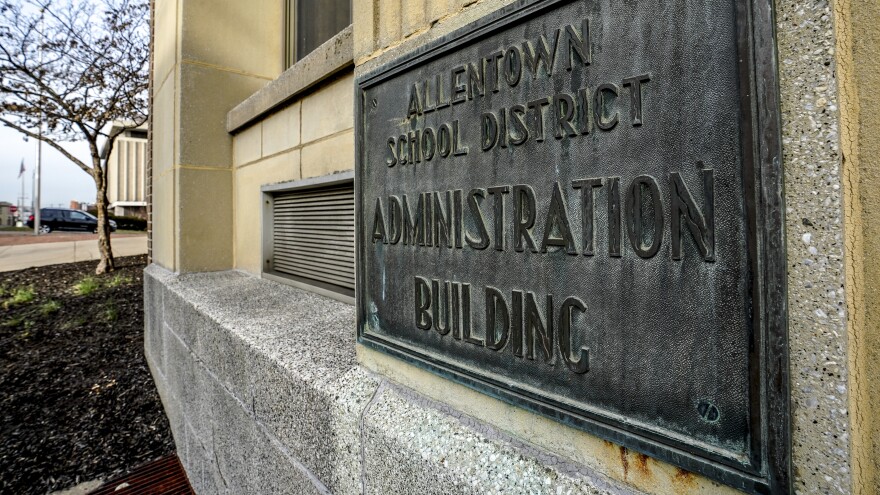ALLENTOWN, Pa. — Allentown School District has not been committed to equity and social justice, according to recently released audit findings.
Educational consultants from The Howard Group conducted an equity and inclusivity audit of ASD from January to April for $90,000. More than 5,100 students, staff and community members participated in surveys, and 86 district leaders participated in focus groups.
Despite being one of few districts in Pennsylvania with a school board equity policy on the books, white leaders in ASD do not understand the need for creating an inclusive culture and leaders of color face retaliation for exposing systemic inequities, according to audit findings.
The audit also found the Allentown School District lacks the cohesion and stability to effectively promote student success.
The goal of the equity audit was to examine ASD’s policies and protocols to determine a more fair distribution of resources and support for students and ASD community members.
The audit assessed five areas: curriculum and instruction; culture and climate; talent recruitment, retention and development; family and community engagement; and policies and practices, such as student discipline.
“The district has already taken steps to address the findings in this audit, by launching our new strategic plan, which brings a unified mission, vision, and core values to the district," Superintendent Carol Birks said in a statement posted on ASD's website.
LehighValleyNews.com combed through the nearly 50-page equity audit report, which was made public in late August. Here are some key takeaways:
School belonging
When it came to survey responses, certain groups were more likely to feel a sense of school belonging. By the definition provided in the report, school belonging meant respondents felt physically and emotionally safe at school and able to try their best academically.
ASD employees reported higher levels of school belonging compared to students. Additionally, Spanish-speaking respondents and male respondents were more likely to report higher levels of school belonging than their English-speaking and female peers, respectively.
Elementary students also reported higher levels of school belonging compared to middle and high school students.
On school climate, elementary students were also more likely than older students to report that their teachers create an inclusive environment and that they feel comfortable discussing topics around racism.
Additionally, elementary students were more likely than middle and high school students to report that they learn about diverse groups of people and can relate to class material.
District leaders highlight concerns
School leaders who participated in the focus group sessions said the district is lacking streamlined inclusive practices. This leaves decisions about inclusion up to individual schools and teachers.
“Allentown has to decide who we are,” one unnamed participant said, according to the audit report. “We need to make a policy behind who we are and stand by that policy and not change it.”
School leaders said class attendance is a problem, and current course offerings do not align with students’ interests. While educators said student voice is important, it’s not clear what efforts are being made in classrooms to activate student voice, the audit found. “Problem” students are being pushed out of classrooms and into online learning, the report found.
“Nobody’s addressing the fact that they’re using virtual learning as a form of discipline,” one leader said.
ASD's virtual academy is the third largest school in the district based on attendance, according to the audit report.
'Initiative fatigue'
Focus group participants also said the district needs more staff trained to work with special education students and English language learners.
The audit report said there are no inclusive policies for recognizing students’ ethnic and cultural identities even as more and more students of color are joining the district, which already has a student body that’s 74.1% Latino.
District leaders focused on compliance, defining success by traditional metrics, such as attendance, behavior and grades. Only a few leaders highlighted food access, health care, safety and a sense of belonging as relevant measures of success, according to the report.
Most participants expressed frustration with high turnover rates in ASD and “short-sighted” and “inconsistent” implementation of district initiatives.
“Teachers [and] administrators feel by the time we accomplish A, B and C, there’s going to be a new leader, and they’re going to come in and do a different A, B and C, so why pull all my time and effort into trying."A participant in the report
Participants said ASD hires people from outside the district who aren’t familiar with the student population. Those employees become overwhelmed and quit, they said.
District staff members also experience “initiative fatigue,” the report found.
“Teachers [and] administrators feel by the time we accomplish A, B and C, there’s going to be a new leader, and they’re going to come in and do a different A, B and C, so why pull all my time and effort into trying,” one participant said, according to the report.
Birks is ASD’s sixth superintendent since 2010, without taking into account acting and interim district leaders in that time.
Uncomfortable conversations
Leaders also expressed concern that data from the district level is not always shared, leaving school staff to rely mostly on their own academic and behavior data.
On professional development, the focus group participants said the district needs more mentoring and training on how to have discussions related to race, racism, gender and sexuality.
School leaders of color expressed the need for training and policies to create inclusive cultures for students of color, the report found, but white leaders did not express urgency or a need for more inclusivity.
Instead, these leaders framed students of color and their families as the problem, noting parents’ lack of education and low socioeconomic status.
Leaders of color also said they have been retaliated against for highlighting systematic disparities impacting student success.
Recommendations
The audit report also put forth recommendations for making ASD more equitable and inclusive.
The report calls for the establishment of “district-wide standardized policies on inclusion” that address classroom and administrative practices. Schools should still maintain flexibility in implementation of the policy to cater to its students' unique needs.
ASD should also integrate multicultural and special education into general education classrooms, the report said.
Success measures should be redefined to include non-academic factors, like well-being. There’s also the need for more holistic support, the audit found, such as more counseling, peer support programs and community initiatives.
For staff, there needs to be more leadership programs focused on long-term strategic planning, and the number of district initiatives should be smaller and more high-impact, the report said.
Additionally, data needs to be easily accessed and regularly discussed. Resource allocation across district schools should also be reviewed to make sure extracurriculars and specialized support services are equitably distributed, the report recommends.
There’s also a need for parents and community members to be engaged with ASD. The report suggested more regularly held town halls, parent-teacher committees and community advisory boards.
Additionally, ASD staff members need ongoing, mandatory training on diversity, equity, inclusion and special education practices, the report said. Educators also need more training on how to discuss race, ethnicity, gender and sexuality.
“By addressing these areas, the district can move towards a more inclusive, effective, and equitable educational environment, better prepared to meet the diverse needs of its student population,” the report concluded.


